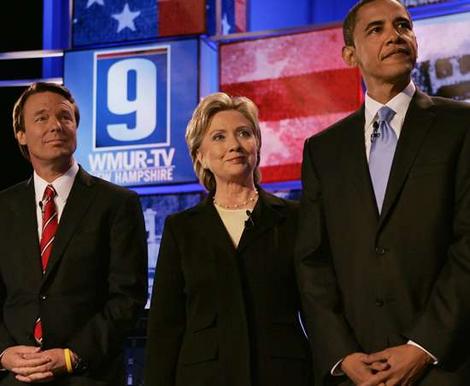“‘You can look at this stage and see an African American, a Latino, a woman contesting for the presidency of the United States,’ Clinton said. ‘But there is so much left to be done, and for anyone to assert that race is not a problem in America is to deny the reality in front of our very eyes.'” Unfortunately, I missed the third Democratic debate at Howard University debate last night, so I can’t comment on the performances of Clinton, Obama, Edwards et al. I can say that this new NBC poll showing that 52% of the electorate wouldn’t consider voting for Hillary under any circumstances conforms to one of my major concerns with her nomination. As I said before, she’s a smart, talented, and impressive politico who’d undoubtedly sail the ship of state much more smoothly than the current administration. (Of course, so would you, I, the night-janitor at the local McDonalds, or almost anyone else one can think of.) But, really: [1] she’s thoroughly lousy on campaign finance reform, to my mind the issue that bears on virtually all others; [2] she apparently didn’t have the wherewithal or leadership instincts to realize the Iraq war was a terrible idea in 2003 (it didn’t take all that much to figure it out, particularly when you figure how much more information Clinton had access to than we did); [3] her view of centrism is apparently to act like Joe Lieberman every so often; and [4] most of the nation has already decided for various reasons that they don’t like her. With the Republicans scattered and in retreat, their ideology in eclipse, why do we keep throwing up marginal, tired candidates — Gore, Kerry, Clinton — on the off-chance that the electorate will manage to surmount their strong negatives, hold their collective nose, and vote for them?
To be fair, the other Dems haven’t been all that great at articulating a progressive alternative to Republican-lite DLC-ishness yet either, but at least there’s some potential for it there. Sen. Obama‘s got all the right JFK moves, and this all-things-to-all-people ambiguity may be one of his strongest political assets. But right now I think he’s relying too much on his initial spate of public goodwill, and missing a chance to really draw the nation’s attention to the issues that concern him. And John Edwards‘ son-of-a-millworker-made-good brand of populism, while laudable, doesn’t yet seem fully formed to me. But, at the very least, Edwards — unlike some of his more-willing-to-triangulate opponents — seems more often than not to let his flag fly, and act from the courage of his convictions. Right now, particularly with McCain hopelessly derailed by his blatant compromises of principle, Edwards may be the closest we’ve got to a Straight-Talk-Express this year (well, this side of Kucinich, Gravel, and Paul.)
At the moment, I’m still leaning towards Obama, just because of his tremendous upside — he, unlike virtually every other candidate, has the possibility to transform, revitalize, and realign our current political debate if he plays his cards right. But, Edwards is still in my estimation, and I’ll be taking a long hard look at him over the coming months (and either, in my humble opinion, are preferable to Senator Clinton, for the reasons listed above.)

